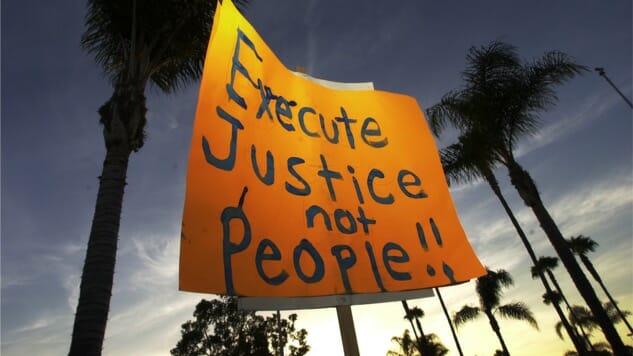Abolishing the Death Penalty Is Becoming One of the Few True Bipartisan Issues
Photo courtesy of Getty Politics Features Death Penalty
New Hampshire officially abolished the death penalty today, with both state houses overriding the veto of Republican governor Chris Sununu, but the really remarkable part is that nearly half of Republicans in the Senate and many in the House “crossed the aisle” to support both the original bill and the veto override. (Democrats needed every single one of them to reach the 2/3 override majority in the Senate.) In fact, with six Republican co-sponsors to seven Democrats, this is about as bipartisan as legislative efforts get these days, either on the state or national level. It also demonstrates rapid change—the same bill was passed last year, but lawmakers didn’t have the votes to overcome Sununu’s veto at the time.
Some of the remarks from Republicans in the lead-up to the bill’s passage were extraordinary:
Senator Ruth Ward (R-Stoddard) spoke briefly before the Senate voted on the bill last month. Her father was killed when she was seven. “He never saw us grow up,” she said. “My mother forgave whoever it was, and I will vote in favor of this bill.”
State Senator John Reagan, a Republican who long believed the death penalty was important to public safety, said during the senate debate that he now favors repeal because “the more and more experience I had with government, I concluded that the general incompetency of government didn’t make them the right people to decide life and death.”
Granted, Reagan’s quote isn’t exactly the morality-based reasoning you’ll hear from most Democrats, but he arrives at the same place. (Interestingly, there is only one inmate sentenced to death in New Hampshire—Michael Addison, who murdered a police officer—and this bill will not apply to him retroactively. Nevertheless, New Hampshire has not executed anyone since 1939 and doesn’t even have an execution chamber, so it’s likely Addison will serve his entire life in prison without being subject to the death penalty.)
New Hampshire becomes the 21st state to abolish the death penalty, and while the map of which states have abolished and which have not seems to fall very much along partisan lines (blue states tend to abolish, red states do not), the fact is that there are bills being introduced in 18 states this year alone, and according to the New York Times, nine of them have already picked up significant Republican co-sponsorship.
There are various reasons to want to abolish the death penalty, from questioning the morality of state-sponsored killing to evidence that it doesn’t function as a deterrent to the cost of prosecuting and executing convicted killers…not to mention the chance of wrongful convictions. But the big takeaway from this story is that in an age of hyper-polarization, Republicans and Democrats seem to be coming together—unpredictably, but happily—on an issue that seems, on the surface, to be just as controversial as any other.